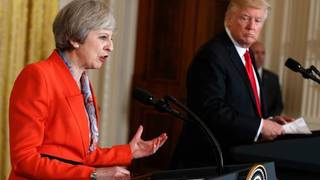British Economy Experiencing Unprecedented Collapse
If the British Empire had an ‘annus horribilis,’ a year it would rather forget, it would no doubt be 1956. In that year Britain along with France and "Israel" conspired to invade Egypt to seize the recently nationalized Suez Canal. Both the United States and the Soviet Union, the new superpowers of the age, stepped in to denounce the invasion, forcing the tripartite aggressors into a humiliating withdrawal. That watershed event saw both Britain and France demoted from the status of first-tier global powers and within less than a decade both of their imperial spheres no longer existed, at least on the pages of the world’s atlases.
For the following six decades, London was able to disguise the extent of its imperial decline through its ‘special relationship’ with the United States, into whose sphere the Empire was absorbed and recast as a system of (technically) sovereign and equal nation-states.
Since the June 2016 referendum on EU membership, however, the discourse of decline has forcefully reasserted itself, with the magnitude of the UK’s diminished standing in the world becoming increasingly apparent. Throughout the course of 2020, the economy’s worst year on record, national GDP experienced the deepest recession in 311 years.
A Crisis of its own Making
Covid-19 could hardly have appeared at a worse time for the British economy. February 1st, 2020 marked the point at which the UK, after a tortuous multi-year process, completed its withdrawal from the European Union following a bitterly contested referendum and years-long political struggle within both major parties to overturn the ‘Leave vote’ which resulted.
Both sides of the issue presented polar opposite predictions for what would become of Britain upon leaving the EU. What is clear is that the near-endless political uncertainty that resulted from the referendum has been the foremost negative effect of Brexit. Part of the City of London’s near-monopoly on the financial services industry has since been lost to centers such as Paris, Frankfurt, and Dublin.
In recent weeks, the consequences have begun to get far more serious and wide-ranging. The empty supermarket shelves warned off by the ‘Remaineers’ have become a fixture across the country, with supply chains on the verge of seizing up. Seven percent of firms were unable to meet their staffing and operating requirements in the last fortnight alone. Not since that year of post-imperial humiliation has manufacturing fallen so precipitously.
Primarily, British supply chains face collapse due to much of their migrant Eastern European workforce having left the country. Tens of thousands of truck drivers, factory and agricultural workers found their presence threatened by an ever-hardening line against immigration. The end of EU membership and the result of the ‘Hard Brexit’ pursued by Prime Minister Boris Johnson has ensured that the previously uninhibited movement of people, goods, and capital has diminished to a trickle.
In an attempt to bat away the increasingly desperate shrieks of the trucking and haulage industry, the hapless Johnson government has suggested that they make their conditions more attractive to British workers, advice that will almost certainly go unheeded. The result of such stubbornness, coupled with a toothless Labour Party in opposition, is that the United Kingdom, one of the richest and largest economies in the world, in a state of domestic peace, could see a nationwide food crisis by the end of the year.
With Brexit already being a politically settled issue (mostly), it bears commenting that this state of crisis is also due to other factors, foremost among them is the resurgence of the coronavirus in China, temporarily shutting down many of the world’s busiest shipping facilities. There is simply no way such measures could not have drastic impacts globally.
Nevertheless, the mainstream business press is speaking with a grim inevitability about the army being brought in to ensure the continued functioning of the economy and to head off previously unthinkable levels of civil unrest. One could hardly ask for a more cutting rebuke of the neoliberal paradigm that has governed Britain now for more than four decades.
Such an unprecedented decline in economic stability would only have a recent analogue in the 1960s, before British accession to the European Economic Community, later to become the European Union. That bout of economic malaise saw the British navy, no longer ruling the waves, withdrawn from east of the Suez Canal, the pound devalued, and the country bailed out by the United States. London may well be about to remember, alas too late, why it attached itself to the continent more than half a century ago.










